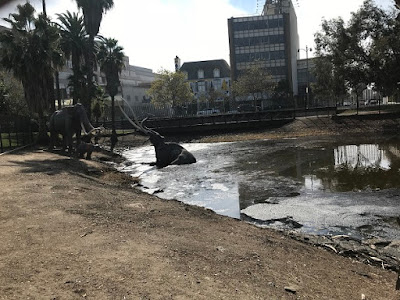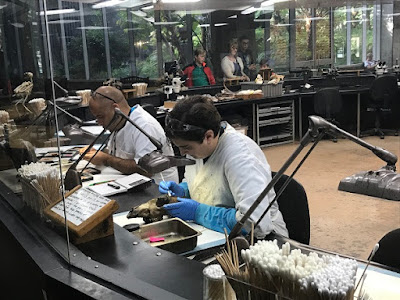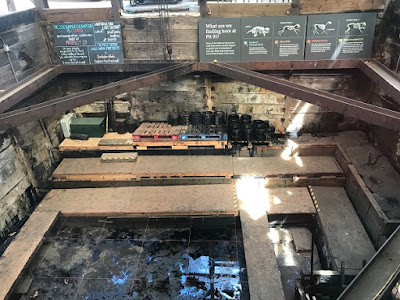The La Brea Tar Pits in Los Angeles, California, are a collection of tar pits which have preserved the bones of trapped animals over tens of thousands of years. They are one of the world's most famous fossil localities, and the Ice Age fossils found there include saber-toothed cats, dire wolves and mammoths. The accompanying museum is dedicated to both researching the finds from the pits and displaying the specimens for visitors. You can visit the pits, watch scientists and volunteers excavating and cleaning the fossils, and we spent a fantastic morning here as a family
The Museum entrance is located opposite the Lake Pit - a large lake which bubbles as gas is released to the surface and is home to iconic sculptures depicting a mammoth trapped in the tar. It's a dramatic way to start your visit! An animal trapped in the pits would have remained there until it died of exhaustion, and a large trapped herbivore might have attracted the attention of other predators which would in turn become trapped and die alongside it. With the amount of fossils recovered it would seem as if this was a regular occurrence, but in fact an entrapment event probably only occurred every ten years or so over a very long period of time.
Inside the museum we began our tour by watching Titans of the Ice Age, a 3D journey back in time which helped to set the scene by introducing the main creatures discovered at the site, and showing how they became trapped in the tar. We also enjoyed the Ice Age Encounters show, which featured a life sized Sabre-Toothed Cat puppet and was incredible to watch.
There is plenty to see inside the museum. The Tar Pull exhibit lets you try and see if you could escape from sticky tar, and at the end of our day having learned more about the tar pits the children both wanted to go back and try again to see if they could have escaped (unfortunately the answer was no!) There are huge assembled skeletons and several animated models like this Columbian Mammoth that is really very realistic.
Since 1906, more than three million items have been recovered from the pits, which represent over 231 species of vertebrates as well as 159 species of plants and 234 species of invertebrates. It's an impressive number which will continue to increase as excavations continue. It's difficult to get a sense for just how many specimens this is, although displays like the one below help a little - this case contains many many different examples of just one bone. There is also an entire wall composed of just dire wolf skulls - it's amazing to spot the similarities and differences.
In the Fossil Lab you can watch a group of scientists as they work on cleaning the new fossils, with some of the work magnified on screens for a clearer view. It's not just the large fossils that are important, there are also many micro fossils like tiny insects and plants which are excavated and studied with just as much care and interest.
There is lots more to see outside the museum too. You can visit Pit 91 which is an active dig site in the summer. Even when not in use it's still fascinating to look down on, and there is plenty of interpretive signage and photographs to help you imagine how the work progresses. We also joined a free museum tour to Project 23 - a collection of 23 large wooden boxes containing fossils which were removed during the construction of an underground car park for the adjacent Los Angeles County Museum of Art. There is years and years worth of work still to go here and it was fascinating to learn all about it and watch the fossil specimens being cleaned.
We had a brilliant morning at the museum. It was truly fascinating, and we all felt like we learned a lot. I'd definitely recommend a visit! You can see some of our highlights in the short video below, including the very realistic life sized Sabre-Toothed Cat!
We received complimentary admission to the museum in exchange for sharing our visit on my blog and social media.









No comments:
Post a Comment
I love reading your comments!